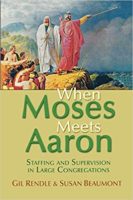
by Susan Beaumont
Nancy is failing in her new role as the Director of Education. The hiring committee carefully chose Nancy from a pool of six candidates. Everyone on the team was delighted with Nancy as their candidate of choice. She was articulate, well-educated and had experience as the principal of a private school. On paper and in person she looked like a great fit for the job.
Now, only twelve weeks into her employment relationship it is apparent that Nancy isn’t going to succeed. She has wonderful rapport with students and their families, but she struggles with the coordination of volunteers, the management of projects, and overseeing a budget. She makes administrative tasks much more difficult than they need to be, adding layers of complexity to tasks that are simple and straightforward.
In retrospect, team members realize that they were taken in by Nancy’s charisma and credentials. They made numerous assumptions about her previous organizational experience. They assumed that someone who had served as a principal would have outstanding administrative skill. They assumed that she must know her way around church volunteerism because she grew up as a pastor’s kid.
How did the team miss Nancy’s shortcomings? They suffered from the halo effect. The halo effect is our tendency to think someone is good in many areas because they have impressed us in one area.
In church environments we often hire based on gut reaction. We make employment decisions based on how the candidate makes us feel during the interview, instead of designing a careful process to ensure that the candidate can do what needs to be done. We pay attention to pseudo cues like appearance, confidence, and charisma, instead of attending to the actual competencies required in the role.
Here are four important practices that you can employ to avoid this troublesome interview trap:
1. Get clear about the requirements of the role:
Before you begin the interview process develop a set of essential functions and core competencies that describe the role. Essential functions are the duties and tasks required. They address the “what” component of the job. What am I be expected to do in order to satisfy your basic expectations? For example, one essential function of the Education Director might be: Responsible for the recruitment, training and coordination of volunteer teaching teams.
Additionally, create a list of core competencies that describe the person needed. Core competencies address the “who” and “how” components of the role. For example: Attention to Detail, Time Management, Volunteer Management, Team Orientation, Delegation, etc. It isn’t enough to simply create a list of competency labels. Each competency must be defined by the specific behaviors that comprise that label. For example:
Delegation: Clearly and comfortably delegates both routine and important tasks and decisions; appropriately shares authority and responsibility; creates accountability; sets clear objectives and measures; monitors process, progress and results; builds feedback loops into the work; trusts people to perform their own work.
2. Focus on behavior, not personality traits:
Candidates applying for a job are likely to use all kinds of labels to describe themselves: outgoing, proficient, effective, team-player, creative etc. Your job as an interviewer is to get beyond the use of labels to determine if the candidate has actually mastered the skills and abilities.
Behavior-based interviewing is an effective technique for evaluating competencies. In a behavior-based interview, you ask the candidate to describe how he actually did behave in a particular past situation, rather than how he might behave in the future. Behavior-based interviewing rests on the premise that past performance is the best predictor of future success.
In this form of interview, you ask an initial question and then follow up with several probing questions. The probing questions ask the candidate for details so that the candidate cannot theorize, fabricate, or generalize responses.
For example, if you are trying to assess a candidate’s delegation skills you might say, “Tell me about a time when you assigned a piece of work to someone and they failed to complete the assigned task.” Additional Prompts: When and how did you follow up? What kind of consequences did the person experience when they failed to complete the task? Did the task eventually get done; how? In what ways did you stay involved? What would you have done differently in retrospect?
3. Watch them do part of the work:
As part of the interview process you can create scenarios of real work for the candidate to perform. For example, a potential choir director can be asked to lead a choir rehearsal. A youth leader can be asked to facilitate a weekly youth gathering. A maintenance worker can be asked to evaluate a particular space to point out what needs attention. An administrator can be asked to observe and evaluate a staff meeting.
4. Check employment reference earlier in the process:
Too often, we wait to do reference checks until we have selected our final candidate. At that point we have already made our decision and we don’t want to be dissuaded from making the hire. We are seeking confirmation that the wonderful person we have settled upon is real, and we do not want to be disappointed. So, we end up asking questions that seek to confirm the halo. Instead, consider doing reference checks when there are still multiple candidates being considered. This way you will ask tougher questions and be open to more critical feedback.
It is easy to be trapped by the halo effect when hiring people for your team. We are all easily drawn in by appearance, charisma and good interviewing skills. Getting clear about expectations, focusing on behaviors, watching the candidate perform the work, and checking references earlier, are just a few of the ways that you can become more intentional in your hiring practices.
Susan Beaumont is a coach, educator, and consultant who has worked with hundreds of faith communities across the United States and Canada. Susan is known for working at the intersection of organizational health and spiritual vitality. She specializes in large church dynamics, staff team health, board development, and leadership during seasons of transition.
With both an M.B.A. and an M.Div., Susan blends business acumen with spiritual practice. She moves naturally between decision-making and discernment, connecting the soul of the leader with the soul of the institution. You can read more about her ministry at susanbeaumont.com.



